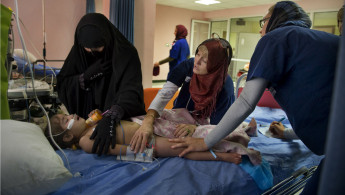Depleted credibility: US admits using radioactive weaponry in Syria
The US army reportedly fired thousands of depleted uranium (DU) shells - classified as radioactive toxic waste - against Islamic State oil tankers in Syria, despite previous and repeated denials.
The US Central Command (CENTCOM) confirmed to Foreign Policy that it fired 5,265 armor-piercing DU rounds at around 350 oil tankers, mainly driven by civilians near Deir az-Zour, between 16 and 22 November, 2015.
The ammunition had been embargoed after a study showed half of the babies born in Fallujah, Iraq in 2012 suffered birth defects.
The study connected the huge rise in defects with the US' army dropping an estimated 440 tonnes of depleted uranium on the town.
Despite its well-known health effects on civilians, CENTCOM spokesperson said the ammunition was chosen because of a "higher probability of destruction for targets."
Arms experts disagree with this explanation however, arguing that oil tankers are not armour-plated and other, less harmful ammunition would have been more effective.
"The use of DU ammunition against oil tankers seems difficult to justify militarily on the basis of the arguments used by the US — that it is for destroying armoured targets," said Doug Weir, head of the International Coalition to Ban Uranium Weapons.
"Tankers are clearly not armoured, and the alternative non-DU HEI [high-explosive incendiary] rounds would likely have been sufficient for the task."
The Pentagon's current Law of War Manual states, "Depleted uranium (DU) is used... to defeat enemy armored vehicles, including tanks."
A US official told the news blog, War is Boring, in March 2015, that the US would not be using DU ammunition in Syria however, because IS did not own many armoured tanks.
"The ammunition is developed to destroy tanks on a conventional battlefield and Daesh does not possess large numbers of tanks," the official said, using an alternative name for Islamic State.
In March 2015, a coalition spokesperson denied that depleted uranium rounds had been or would ever be used in the fight against Islamic State.
"US and coalition aircraft have not been and will not be using depleted uranium munitions in Iraq or Syria during Operation Inherent Resolve," said John Moore, referencing the military term for the fight against IS.
Human rights NGOs have warned in the past about the use of depleted uranium, especially in civilian areas, as it is effectively weaponising toxic waste.
A 2014 review of depleted uranium munitions by the International Coalition to Ban Uranium Weapons [ICBUW] found 'overwhelming' evidence that it caused cancer in civilian areas after fighting had ended.
"The rush to develop and deploy these weapons resulted in the dispersal of a substance with little understanding of the risks to civilians," said ICBUW Coordinator Doug Weir.
"Risks that continue to this day because the states that have used these weapons in Iraq and elsewhere have never seriously tried to clean up their mess."




 Follow the Middle East's top stories in English at The New Arab on Google News
Follow the Middle East's top stories in English at The New Arab on Google News
![The UAE is widely suspected of arming the RSF militia [Getty]](/sites/default/files/styles/image_330x185/public/2024-11/GettyImages-472529908.jpg?h=69f2b9d0&itok=Yauw3YTG)
![Netanyahu furiously denounced the ICC [Getty]](/sites/default/files/styles/image_330x185/public/2024-11/GettyImages-2169352575.jpg?h=199d8c1f&itok=-vRiruf5)
![Both Hamas and the Palestinian Authority welcomed the ICC arrest warrants [Getty]](/sites/default/files/styles/image_330x185/public/2024-11/GettyImages-2178351173.jpg?h=199d8c1f&itok=TV858iVg)